Neil Peart's News, Weather and Sports
A Winter's Tale Of Summers Past
NeilPeart.net, February 2009
This story began as a brief introduction to a book review. At the outset, my modest goal was to relate how the reading of a book sometimes has its own story to tell, outside the book's covers - how I happened to choose a particular book, and the events surrounding its reading.
At the time, I was on my annual "winter retreat" in Quebec, enjoying a couple of weeks of snowy solitude. I spent my mornings writing, and in the afternoons went cross-country skiing or snowshoeing, so there was plenty of time for thinking. The snow was almost five feet deep, and as I glided or strode across its high white cushion, I found it hard to hold onto the notion that I was so far above the ground - elevated on the surface of another element, water-become-earth, a quintessence shaped by both, and by wind, plus reflecting the sun's fire in diamond-dust prisms.
Clearly, I was high on winter.
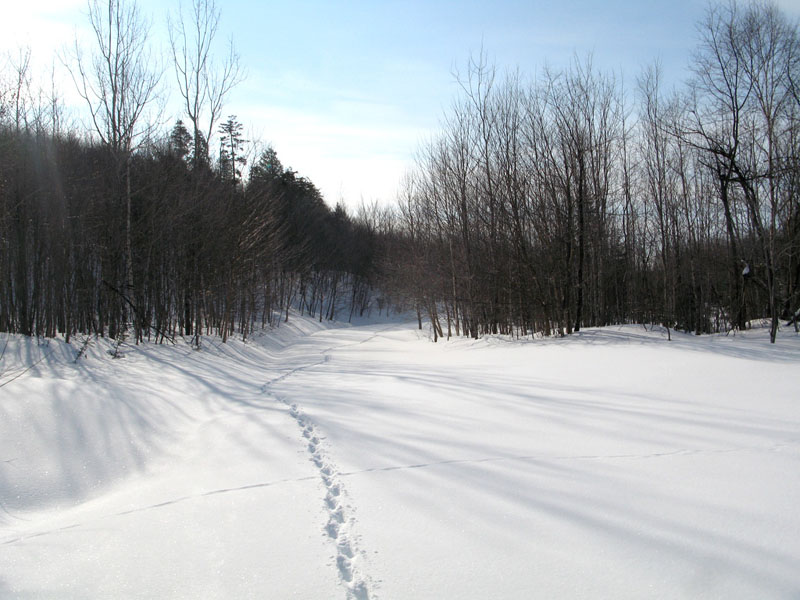 |
Something big, this way went, crossing something small ... |
After a day or two without fresh snow in the woods, other tracks began to appear on my immaculate cloud - a neat line of fox prints; deer following my packed-down trails to make their own passage easier; the widely spaced impressions like little snow angels left by the snowshoe hares, where they have leapt from one spot to another to feed on the cedars (come spring, those nibbled patches will be five feet off the ground). Their namesake large back feet land in front of the smaller front paws, ready to leap again. Deep in the woods, I might be lucky enough to see a row of holes in the snow the size of salad plates, where the huge moose, the local monarch, has struggled through. Far from roads and houses, I might also cross the purposeful-looking long strides of wolf tracks, sometimes two or three sets widely separated, where they coursed the woods together.
Standing atop a snow-covered beaver dam, I see the builder's recent leavings (a brown and yellow territory marker), and the chute where it slid down into a hole in the ice. Otters, too, leave a series of sliding chutes across the snow, where they made their playful progress together. The lowslung weasel - ermine in this season, when it turns from brown to white - propels its body through the snow on tiny feet, a straight line marked by delicate indentations. A similar but larger track is probably a fisher, a fearsome little beast I described back in summer '07, in a story called "That's the Way We Roll." Its occasional prey, the porcupine, leaves an unmistakable trail, a deep, curved chute where it has pushed through the snow like a plow, leaving rows of straight lines from its trailing quills.
A circle of feathers, like a nest, shows where a fox has made a meal of a ruffed grouse, leaving only the feathers and a few stains of rusty blood. The fox likely pounced on the bird under the snow, where grouse take refuge in winter, and where they are also sometimes trapped by icestorms that lay a solid blue skin across the surface above.
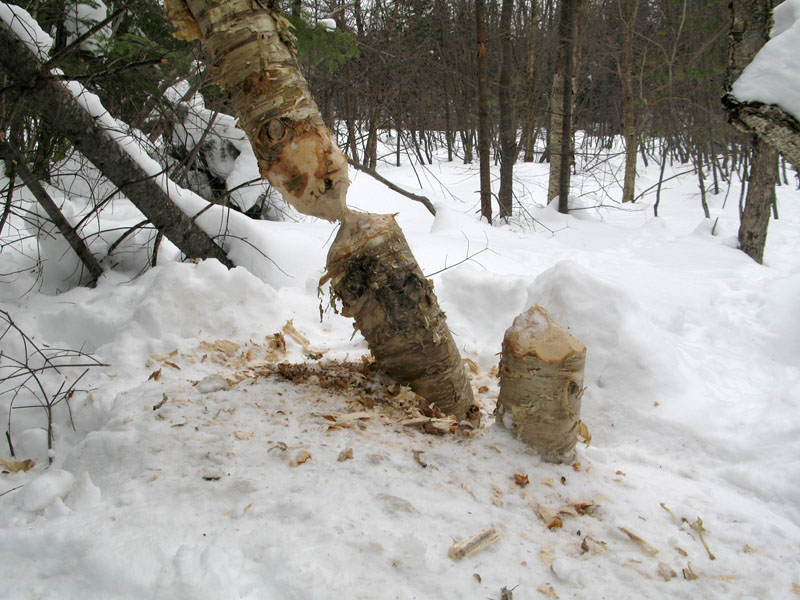
As I glide along the ski trails, or break deep tracks in the virgin snow on the snowshoes, I see all these stories written in the snow, but I seldom spy their elusive authors in the silent woods. Occasional birds flit by, mostly chickadees, and maybe a hairy woodpecker, a male by the red cockade, tapping at a frozen bare tree. One day I saw a fat brown beaver, down along a frozen streambed, and watched it waddle in alarm from a fresh-cut tree it had been working on. I waddled over myself, on my snowshoes, to examine its work, and the well-worn, icy chute leading to its tunnel to safety, a circle of icy water far down at the bottom. Somewhere nearby there would be a domed lodge of branches and mud, accessible only from underwater, where the beaver family dozes in semi-hibernation (one assigned to sleep with its tail in the water, to monitor temperature and depth, so they don't become trapped by ice).
Up to about a hundred years ago, beavers were hunted and trapped to scarcity in North America (their smaller European cousins long near extirpated), to feed the European fashion for beaver hats. (Not like those furry bearskin hats, as I used to think, but the beaver's short underfur was made into a kind of waterproof felt). The fur trade that did so much to build modern Canada was largely founded on beaver skins (the beaver was featured on our first postage stamp, and on our five-cent coin, and is considered a symbol of Canadian "industriousness," like the beehive to Utah). Even after fashion switched to silk hats, around the mid-1800s, there were still three million beaver pelts sold in London over the next twenty years.
By the early twentieth century, beavers had become rare in Canada, too, and the animals and their dams were protected. The beaver proved its rodent heritage by being adaptable and prolific - some scientists believe there are more beavers in Canada and the northern U.S. now than even before Europeans arrived, and of course there's not as much room for them (imagine a time when it was said a squirrel could travel from Maine to the Mississippi without touching the ground, just passing tree to tree). Few predators remain, like wolves, the smaller, fierce wolverine, and bears, that would tear their lodges apart.
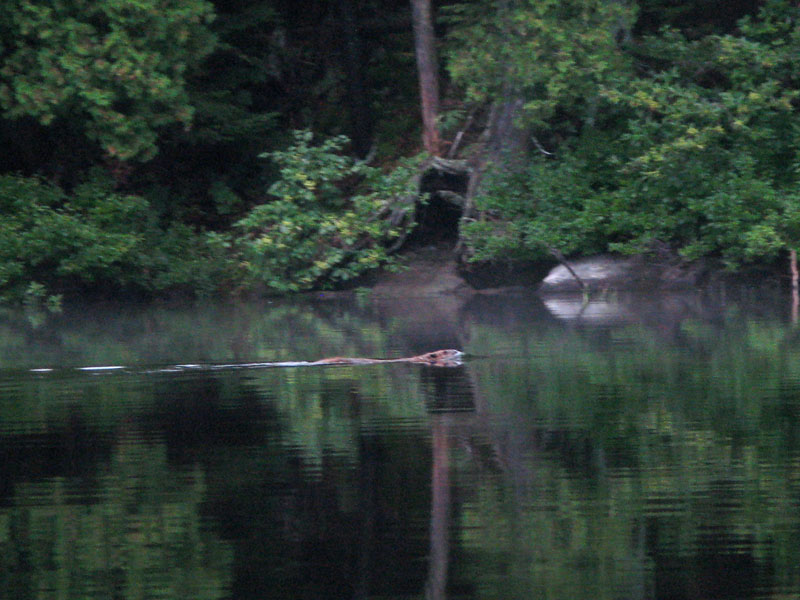 |
Beaver swimming by in summer |
Today beavers are often considered a destructive pest, as they take down many more trees than they need for food or dam construction - partly because their characteristic front teeth continue to grow, and must be exercised, but mainly because that's what beavers do. The same with building dams and altering the landscape around them, with an almost human disregard for collateral damage; the Quebec woods are dotted with shallow swamps fenced and pillared with the bare trunks of dead, drowned trees, where beavers have flooded a low-lying area. Some of my otherwise-gentle, nature-loving neighbors have become virulently anti-beaver, after enduring repeatedly flooded driveways, or the loss of every birch tree along their shoreline. If enough complaints are made, government agencies have to hire trappers (which gives them a job, at least).
So I'm gliding along the ski trails, or breaking deep tracks on the snowshoes, and thinking, thinking, thinking. Or more accurately, in the words that came into my mind one day, noting how all my reflections were then chewed over and formed into sentences, I was "Writing, writing, writing."
With all that going on, the little tale that was supposed to introduce a book review just kept on growing. Finally it became so long that the management of Bubba's Book Club demanded that I move it over to the story section, where it belonged. (Bubba is so strict.) So here we are.
Back in June, 2007, the band and crew were launching our Snakes and Arrows tour - a tour that also kept on growing (like this story, or beaver teeth), and would eventually take us into the summer of 2008. (Good thing we didn't know that then, or we would have been frightened.)
The first three shows, in Atlanta, West Palm Beach, and Tampa, were followed by a day off on Sunday, June 17, before the next night's show in Raleigh. On the afternoon of the Tampa show, I was sitting in the front lounge of the bus with maps of the Southeast all around me, thinking about where to go.
In motorcycle and car magazines, I had read of the Biltmore Estate, in Asheville, North Carolina. It seemed to be favored for the introduction of new models to the press because it was an exotic location near some fantastic touring country - the Great Smoky Mountains, the surrounding Appalachians, and the neighboring foothills, with their wonderful little roads, including the famous Blue Ridge Parkway, winding through forested mountains.
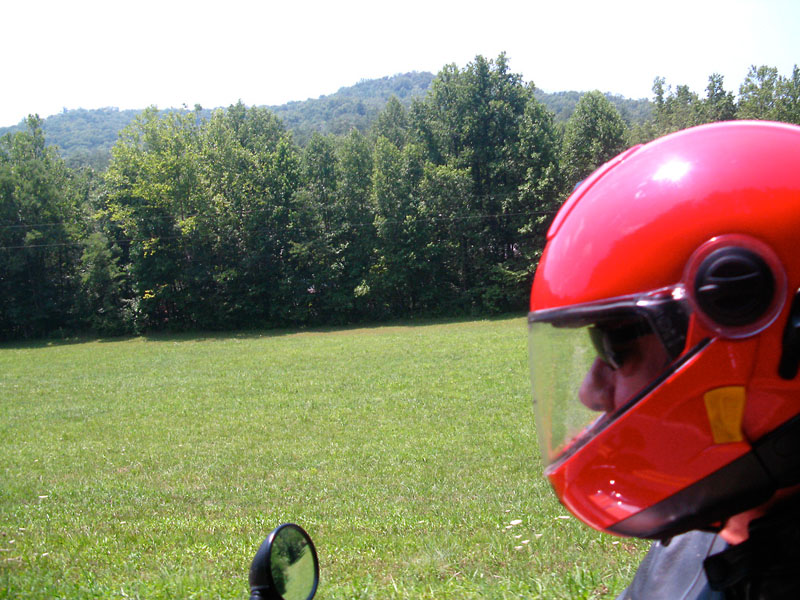 |
Meadows and mountains of North Carolina |
It seemed from those magazine stories that you could stay at the actual estate, so I thought that would make a good destination. I chose a dropoff point along I-95 in Georgia (I usually try to keep our after-show drives to around three hours, so by the time driver Dave was looking for a truck stop or rest area to park in, I was ready for a shower and sleep - in a stationary bus), then traced a long, complicated route across the back roads of South Carolina, through the mountains, curving back east to Asheville for the night off, then on to Raleigh - the show-day ride a straight shot of about 250 miles, so we should have time to explore some more back roads that day.
Early that Sunday morning in mid-June, Michael and I unloaded the bikes and zigzagged our way northwest toward the mountains. I had included Deals Gap in the route, because it was there, and because that stretch of U.S. 129 in the southwest corner of North Carolina has become perhaps the most famous motorcycling road in the East ("The Tail of the Dragon," "318 Turns in Eleven Miles," etc.). However, it seemed that little piece of road was getting a little too famous.
On our previous visit, in the fall of 2002, Michael and I had stayed overnight at Deals Gap, in the humble motel (foodless, alas - I think we were reduced to microwave pizza that night). A tree in the middle of the parking lot was decorated with smashed pieces of motorcycle bodywork - the "Tree of Shame," for those who had been shaken off the Dragon's Tail. That tree and its decorations told a cautionary tale. Maybe a half-dozen other riders were staying there that night, and in the morning, Michael and I were alone on the Dragon (a dramatic test of riding technique, to be sure, at any velocity).
Four and a half years later, the roads in the surrounding area had been just as enjoyable, but as the two of us rode through the crossroads at Deals Gap, my eyes bugged out in my helmet - it looked like the circus had come to town. The motel and campground were jammed with hundreds of motorcycles, and sports cars, too (whole clubs of Miatas and Porsches). Tent-marquees had been put up across the road over rows of racks dangling souvenir T-shirts. I had read recently that increasing traffic, and motorcycle crashes (for the Tree of Shame), had led to a reduced speed limit, and its stern enforcement by numerous LEOs (law-enforcement officers - I picked up that useful acronym from a Web site about Deals Gap).
However, as one who travels so widely on American roads (over 30,000 miles annually in recent years, on two wheels and four), I know that's the story everywhere. In just the last few years zero-tolerance speed enforcement has increased out of all reason, and LEOs have become, perforce, not peacekeepers, but predators. Bad economic times raise crime rates in any country, I know, but this increase in police action is not crime fighting, alas, but revenue gathering.
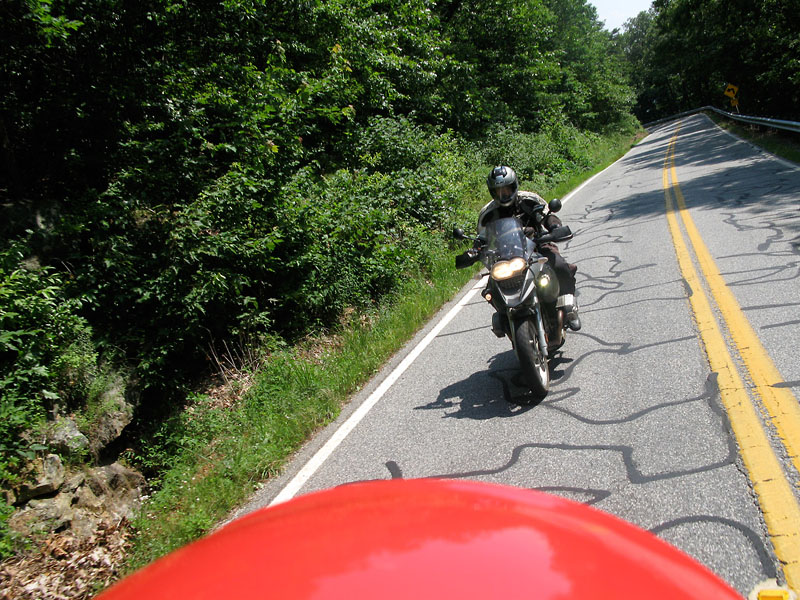 |
Pavement snakes, roadside arrow - (And sometimes snakes hiding at the roadside, too ... ) |
It's a war zone out there - state troopers parking behind bridge abutments and leaning over their car roofs like snipers with high-powered laser guns, and even local cops are casting their nets wider to the state highways, while county sheriffs prowl along handy stretches of interstate, wanting a piece of the action.
But on that busy Sunday in Deals Gap, the traffic alone was enough to slow our progress - we were stuck in a halting parade of Harleys and clones all the way through the 318 sharp turns, switchbacks, and tricky hairpins. That kind of riding was way beyond the limited cornering clearance of such "fashion statement" motorcycles, and apparently beyond their riders, too. But at least they'd be able to say they had ridden the Tail of the Dragon. And eventually even those leisurely cruisers drew ahead of us, because we were crawling behind one wobbly neo-biker who looked the look, but most assuredly could not ride the ride (my Harley-riding friend Dave has a sticker on his helmet that reads "$20,000 and 2,000 Miles Does Not Make You A Biker"). This specimen of fragile masculinity could not bow to letting us by - but at least we would not be having any conversations with the cops in the bushes. (Though they must have been snickering to themselves as we passed.)
Witnessing all that, I thought to myself, "Deals Gap is over."
This past summer I was introduced to a less well known area of pavement paradise, just to the south, in the mountains of North Georgia. Ever since the day and night Michael and I spent there in July, I have been wanting to write a story about it, but have put it off for two reasons. One, I wanted to get it all down in a way that would do justice to the experience, and second, I wasn't sure I really wanted to tell too many people about it.
But I've had that argument with myself before, and decided it was better to share. And I hate not being able to write about good things.
So, in July 2008, in the last few days of the tour, Michael and I were invited by our friend Wes, guitarist with the excellent band Porcupine Tree (and a fine player and singer as a solo artist), and his wife Rebecca, to join them at a small resort called Two Wheels Only, in the tiny hamlet of Suches, Georgia. As the name suggests, it is a resort for motorcyclists, with an inn and restaurant surrounded by a campground. On a hot, bright morning, Michael and I rode in from the bus to meet Wes and Rebecca, and the four of us went for a ride.
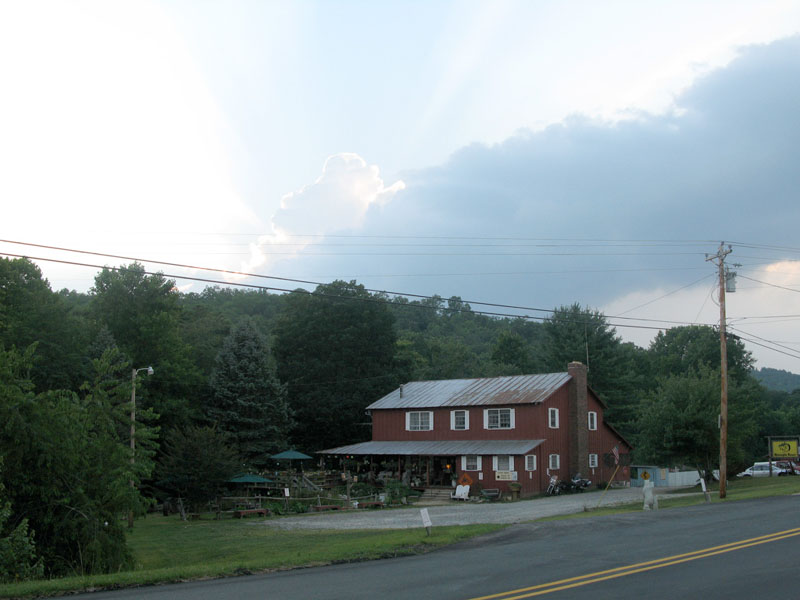 |
Two Wheels Only, Suches, Georgia [note radiant sky - "silver lining" - used in a previous story, "Independence Day"] |
Wes had "warned" us about Becca - that she was a fast rider, and when they were traveling together he usually just followed her around - so we let her take the lead. Carving through the tight corners between thick forest and rocky cuts, and along meandering streams, she set a fast pace on her little Supermoto-style bike, followed by Wes on his yellow Ducati Monster (dubbed by Michael the "hand banana"), and Michael and me. The challenging, endlessly winding roads were almost empty of other traffic, and we had a fantastic ride on a route they called "To Helen Back," to the small, Bavarian-themed Georgia town (I know - what?) called Helen, where we had a Bavarian-themed lunch (the wurst, ha ha), then back around by way of the summit of Brasstown Bald. Dinner that night at T.W.O. was also unforgettable, hosted by owner G.T., his friend Turbo, and Mimi, a schoolteacher from across the road who helped out around the place.
The large main room was comfortably arrayed with dining tables and chairs, sitting areas, and a pool table, the walls plastered with motorcycling posters and memorabilia. Michael and I shot a little pool before dinner, and I attempted a few difficult bank shots that actually went in. Michael expressed his surprise (he's so competitive), and I didn't let on that no one was more surprised than me. My streak was soon over, though, and I was back to being ... a loser. Alas, there is no game or sport that I can actually win at, and of course that's why I am drawn to endurance activities like cross-country skiing or swimming - there's no losing.
A friend once mentioned to me in a conversation about cross-country skiing that after all these years I must be a pretty good skier. I considered the notion, but shook my head and said, "No way, I'm terrible - I fall down all the time, I flail and swear. My technique is pathetic. It's just that I can do it for a really long time!"
Endurance is my only salvation - in sports, in work, in life. I was thinking about that one day this past January, in California, when I got up at 5:00 a.m. and drove 350 miles to the Bay Area, then turned around and rode my motorcycle 350 miles back, all in the rain. That day I thought to myself, "That's one thing I can do - I can endure."
And that's probably why I enjoyed my stay at Two Wheels Only, and riding the surrounding area. Just, you know, endured it.
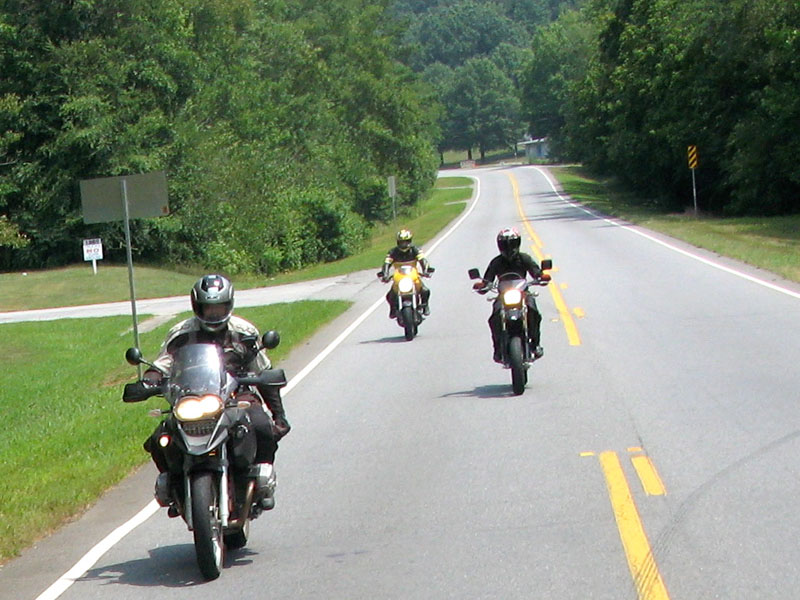 |
Michael, Wes, Rebecca, en route to the Atlanta show"] |
I don't want the place to get too popular. So I don't recommend it - I really don't ...
And back to the summer before, leaving busy Deals Gap in June, 2007, Michael and I continued on, winding through Great Smoky Mountains National Park, which was also awfully busy - mid-June was getting into the height of the tourist season, after all, and it was a Sunday. I have written before about the incredible numbers of people who flock to Pigeon Forge (pun absolutely intended) and Gatlinburg every year; it is the most popular destination in the Southeast (first most popular is the park itself, though only for driving through - few people actually, you know, go out walking in the woods - and the second most popular destination is ... Dollywood). Growing frustrated by the traffic and our slow progress, Michael and I escaped to I-40 and rode east to Asheville, arriving late in the day at the Biltmore Estate.
I was disappointed to find that the hotel wasn't actually part of the mansion, which we barely glimpsed in the distance. It was a conventional modern hotel on the grounds nearby, but it was a nice enough place, and the restaurant was very good. Our waiter was a tall, bearded man in his forties, who served us with cheerful courtesy. He was reserved and dignified, but good humored, and smiled readily when Michael did his usual routine, giving his order then pointing at me and saying, "And my father will have ... "
I fired right back, tossing my head and seething out between my teeth, "That's right, baby - who's your daddy?" and the waiter laughed out loud. (In those days Michael was a very old-looking - if boyish-faced - thirty-five, while I was a youthful fifty-four.)
At the end of the meal, when the waiter brought a leatherette folder that appeared to be the bill, and placed it in front of me, I laughed and pointed at Michael, "Oh - that goes to him!"
I rolled my eyes and added, with facial italics, "the 'Boy.'"
The waiter tapped the folder and said quietly, "This is your waiter ... being discreet." Then he moved away.
Curious, I opened the folder and saw a small note. I put on my reading glasses and opened it:
"Rohinton Mistry, 'A Fine Balance' - An absolute MUST for Bubba's Book Club!"
Below that, "P.S. Atlanta was fantastic!"
I showed the note to Michael, and he nodded and said, "That's pretty cool."
And it was. Throughout the meal, I had picked up no hints that our quiet, dignified server was a fan, and the Atlanta show - the first of the tour - had only been a few days before. Also, Atlanta was much farther away from Asheville than the next day's show, in Raleigh, so apparently he was a pretty serious fan, too - as of course he would have to be to know about Bubba's Book Club, and to feel so strongly about a book he thought was "an absolute MUST" for it.
I wrote a little note thanking the waiter for his good service and recommendation, autographed it, and put it in the folder. When he returned to our table, I slid the folder across, saying, "This is Bubba ... appreciating your discretion."
(Of course that little anecdote was the introduction to the book review I was talking about - the one that started this whole business.)
When Michael and I left the following day, we picked up a stretch of the Blue Ridge Parkway and meandered around for a couple of hours, then surrendered to the interstate - we still had a long way to go to work. And unfortunately, the "anti-destination league" was in full force that day. Both lanes of eastbound I-40 were clogged with slow drivers, and again and again the same pattern was repeated. We'd sit behind a car in the so-called "passing lane," wait for the driver to pull over and let us by, and after a few minutes, give up and go around to the right. I hate having to do that, as it immediately puts me in the wrong (remembering my cardinal rule: "whatever happens, it mustn't be my fault"), so when I pulled in front of the offending drivers, sitting there like fat lumps, I couldn't resist sweeping my left arm overhead, and pointing to the inside lane. Nothing obscene - just a suggestion that they "do the right thing."
Passing through Greensboro, the traffic was heavier, in three lanes now, but no less inconsiderate, and we were forced to pass on the right so many times that I was getting a little steamed - literally, in the 90° heat, and figuratively, as we were running late and I wanted to get to Raleigh. Suddenly, out of nowhere, there were flashing lights in my mirrors, and Michael and I were pulled over. It was a local cop, and he claimed he had been following us, watching us "weave through traffic at high speed," which he said he had clocked at 90 miles-per-hour.
Well, we knew that was absurd - neither of us had made one pass that was not properly signalled and safely negotiated, and there was no way we were making that kind of speed under those conditions. Plus my radar detector had never made a peep in my earpiece. It seemed obvious that some peevish left-lane squatter had used his cellphone to call Deputy Barney Fife (we were in North Carolina, after all, home of "Mayberry") and report "a couple-a maniac bikers weavin' through traffic at about ninety!" And that was all ol' Barney had to hear to swing out onto the interstate and come after us.
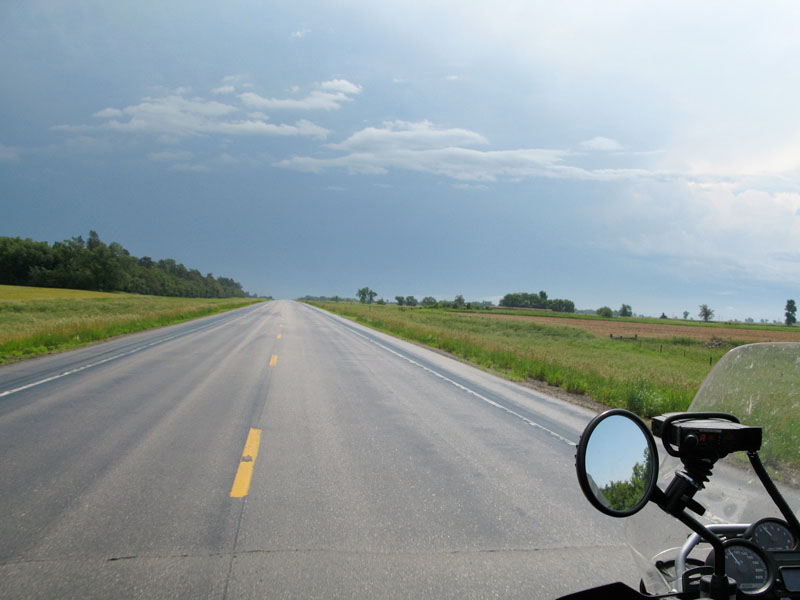 |
South Dakota highway, after a summer rain |
But however spurious, it was a serious charge, reckless driving or something, and I had to fight it. And sure, I had the resources to hire a local lawyer, collect documentation and letters-of-reference from LEOs of our acquaintance, and succeed in having those ridiculous charges dropped - but many other people could not have fought such injustice, so it continued to rankle. I hate that kind of stuff. (Like the line in our song "Resist," "I can learn to close my eyes/ To anything but injustice.")
This image was taken on the fly as I rode solo along the back roads from somewhere in Kansas to Minneapolis, in the summer of 2008. It was one of my favorite photos from the tour, but I never found a place to use it until now. Among the tales this picture tells, there's the pretty, open country, the way I felt riding through it (good), the road shining from the passing rainshower that's fading off to the east, ahead of me (also good), the bug-splattered windscreen, the speedometer showing about 60 mph, the trees reflected in the mirror, and beside it, my guardian radar detector.
Contrary to the shrill ravings of some authorities (like Ontario, Quebec, New York, and Virginia, who ban radar detectors), the proper use of this device is not to allow me to blaze lawlessly through small towns, scattering children and old people, or to weave recklessly through traffic on busy highways. The radar detector is really for a moment like this, when I might be cruising a little faster (without a camera in my hand), maybe at a perfectly safe and reasonable 70 mph, only to be ambushed by a radar gun over the horizon, followed by a boring and costly conversation about the posted limit being 55. That's what a radar detector is for.
So endeth ... the lesson.
Back on the road to Raleigh, Michael and I arrived at the venue that afternoon, hot and tired. After I cleaned up and got myself organized, I called my wife Carrie and told her about our adventures, and how exhausted I was from traveling.
Now ... in this reporter's experience, a woman rarely misses an opportunity to try to teach a man a little humility, and Carrie just said, "Well, you didn't have to do all that."
Taken aback, I thought for a moment, then blustered, "Sure I did!"
It seemed obvious to me. I had to work in Tampa Saturday night; then in Raleigh on Monday night. So looking at that day between, I could only think, "What's the most excellent thing I can do?" If I settled for something less than that, I just wouldn't feel good about myself, or about how I had spent my day.
One time my friend Matt Scannell and I were on a road trip together up around Big Sur, driving in my Aston Martin DB9, on one of the great roads of the world, on a bright winter morning when we had it to ourselves, and we were "in the moment" big time. We talked about how wonderful it was to appreciate an experience while it was happening, and how important it was to make the effort beforehand to make that moment - to put yourself into places and situations that might turn out to be that excellent. Appreciating the moment is not a passive endeavor, at least for those who want to appreciate as many moments as possible.
Typically, I tried to frame that sentiment in a line for a rock song, even while I was driving us along that majestic coastline. In an earnest monotone, I sang it to Matt:
"Wake up every morning like you're gonna live forever
Go to sleep at night like it's the last day of your life."
Matt nodded and smiled, and said, "Remember that line - it's good." I said, "Dibs!," and he laughed. "You know, I think when you say something, it's kind of automatically 'dibs.'"
Oh, yeah. Right.
Later it occurred to me that maybe the reverse was even better:
"Wake up every morning like it's the last day of your life
Go to sleep at night like you're gonna live forever."
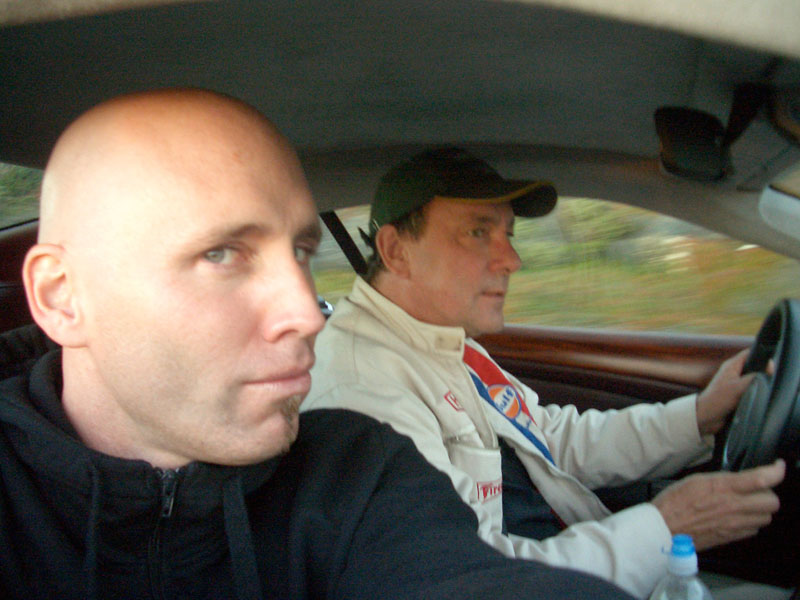
It's funny how Matt and I so often think and talk in terms of songs - whether finding the right words to express a feeling or experience, collaborating on a couple of songs that pleased us, or dreaming up elaborate stage musicals like last year's Snowdance (see "The Best February Ever"), or more recently, a couple of massive conceptions that we have discussed back and forth in arch seriousness, and outlined in great detail. One is a kind of California cars-and-guitars surf opera, based on a fictional surf group called Lola and the GTs, with fast cars and faster women. Or an R&B musical extravaganza called Supernatural Lover, which will recount the adventures of a teenage Casanova, but on a mythic plane. Drawing upon musical moods from the likes of Marvin Gaye, Isaac Hayes, and Barry White, the curtain opens on a dramatically lit stage lined with ranks of angelic, white-robed maidens, then builds through time-honored themes like Stained Innocence, Young Conqueror Rampant, and the Unattainable One. (Obviously based on the adolescent exploits of the younger, cuter one of us).
But back to "the moment" (the generic one).
It's important to stress that such an approach to life doesn't have be all exigent or anything - it's not like you always have to be doing something. Sometimes there is definitely "excellence," and satisfaction, in doing nothing at all.
When I first arrive at my refuge in the Quebec woods, for example, I am more than content to hibernate for a few days (or "estivate," in summer), doing nothing, with nobody. Just keep the fire going, enjoy the silence, and open a good, long book.
As to whether I "have" to do any particular thing - like after a few days in Quebec, when I'll be out skiing, snowshoeing, or rowing and swimming in summer - my answer is yes, I do. I have to do things. Sometimes hard things. That is a conversation I have obviously thought back to many times, and "written about" in my head.
Similarly, there's another comment I've heard a few times, when I might mention to someone that a particular activity or journey I had undertaken had been grueling, and how sore and tired, and maybe ill (thinking of bicycling in Africa) it left me, and I'll hear in response, "Well, that's what you wanted to do."
Yes ... but my desire to attempt a challenge certainly doesn't diminish its difficulty - the opposite, usually - and doesn't mean it would be any easier if I hadn't wanted to do it.
So the most excellent thing I could do on Sunday, June 17, 2007, was ride across South Carolina to Deals Gap, then east to Asheville, and the next day make it to the show in Raleigh. The little note from our waiter at the Biltmore Estate became a bookmark at the back of my journal, marking the "bike service needs" page, for the rest of the tour, and I still have it. Of course I remembered that book recommendation anyway, and it happened that at home, we already had a copy of that dauntingly thick novel (700 pages) in our bookshelves, given to Carrie by her Toronto photographic printer, Bob Carnie.
This February, I brought that book with me to Quebec. In those first couple of "hibernation" days, I settled in on the sofa, fire blazing, warm and radiant, snow falling in slanting curtains outside, the birds flocking around my feeding station, Chef Ellwood's Birdbrain Café. Chickadees, woodpeckers, jays, redpolls, nuthatches, and a rare and striking visitor, the pine grosbeak - large in size, and richly colored, the males rosy-gray, the females olive-gold, both with delicate black and white patterns on their folded wings. The pine grosbeaks usually winter farther north, but are sometimes driven south by harsh weather.
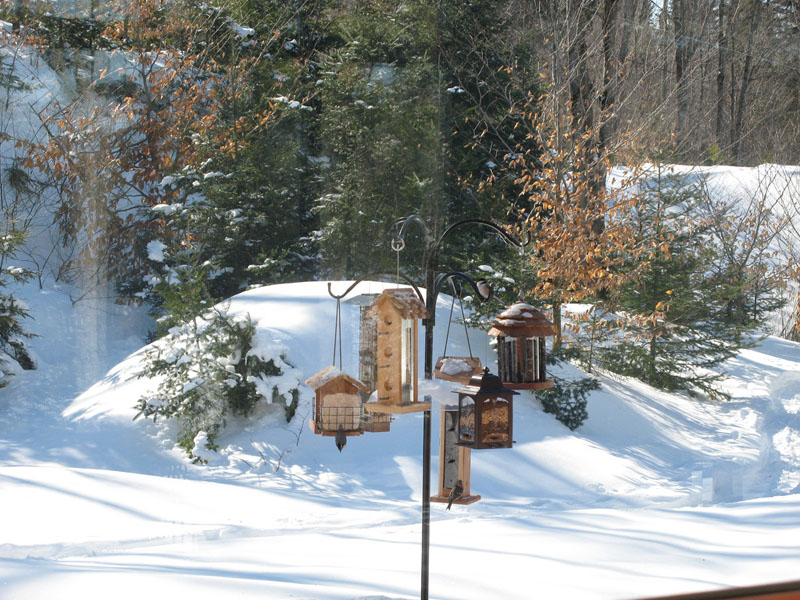 |
Chef Ellwood's Birdbrain Café left to right, nuthatch, redpoll, chickadee |
The birds made me smile, especially the perky chickadees flitting around ten or twelve at a time. (If I go outside to fill the feeder, they will fly up close beside my head, in a whir of wings, and land inches away from me and continue feeding. With a little patient stillness, they will even eat right out of your hand.)
The silence was perfect, the day was perfect, and there was nothing more important to do than watch the birds for a little while, then open my book and start reading.